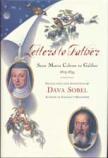Poor Poor Clare
Dava Sobel’s 1999 bestseller, Galileo’s Daughter, made the 17th-century cloistered nun Virginia Galilei (in religion, Suor Maria Celeste of the Franciscan order of Poor Clares) into a worldwide celebrity. Despite its title, however, Galileo’s Daughter was really about the life of the celebrated scientist, and not his daughter, selections from whose letters were used above all as interesting springboards to propel forward the author’s well-wrought and informative narrative. In Letters to Father, on the other hand, Suor Maria Celeste takes center stage. Sobel’s new work is a handsomely designed, discretely annotated, bilingual edition of the complete set of the surviving 124 letters written by Maria Celeste to her father between 1623 and her death 10 years later at the age of 23.
Most of the content of these letters is concerned with extremely mundane, domestic mattersshirt collars bleached and starched, money borrowed and loaned, homemade candied fruit promised and deliveredwith only passing discussion of the larger emotional, social, intellectual, political or ecclesiastical issues impinging on their lives. Nonetheless, Maria Celeste’s missives to her father still make for fascinating, pleasurable and ultimately enlightening reading. Precisely because of their humble, domestic, utterly private nature, the letters help give true flesh and blood, an enlivening third dimension, to historical personages that more exalted, formal documentation published treatises, papal bulls, inquisitorial reportscannot supply.
Questions of historical importance or utility aside, I found it a pleasure simply to be in the company of Maria Celeste. From these lettersspontaneous outpourings directly from the heart, scribbled often at the end of an exhausting day of workthe woman comes across as a truly loving and lovable, gentle, radiant soul whose faith in God is deep and genuine (despite the forced nature of her vocation) and whose feet are at the same time firmly planted on the ground. She is, furthermore, a good writer of intelligent mind, poetic imagination and surprising power of verbal expression. The simple, direct humanity of her communications is extremely appealing. Wistfully she begins a letter, Something in the peaceful air today gave me half a hope of seeing you again, Sire.
All of this makes me grieve for the constant, appalling suffering that the poor woman had to endure, which comes across abundantly in these letters. An illegitimate and unmarriageable daughter, she was forced at the age of 14 into a convent of the Poor Clares, whose rule mandated a life of absolute poverty. Maria Celeste does not even have a cell of her own in which to sleep, having had to relinquish to her emotionally disturbed blood-sister Arcangela their once-shared space. (Their celllike all cellshad been purchased, according to convent custom in those days, for a large sum of money.) It is sad to note that, unfortunately, the voluntary and holy yet unrelenting, survival-threatening poverty of these nuns did not liberate them at all from money. To judge from these letters, in fact, it forced them to be as obsessively aware of it as any avaricious wealthy person.
As bad, if not worse, was the psychological deprivation. In Maria Celeste’s passionately expressed love for her father one can hear the desperation of an affection-starved woman stranded in an emotional desert. She and the tormented Arcangela would be, one letter cries out, abandoned orphans without their father. There is no mention of any psychological support or joy derived from her community. In one letter she begs her father to return the community’s clock, which he was to repair; otherwise these nuns will not let me live. In another Maria Celeste tells of the horrendous nervous breakdown of their mistress of novices, who had to be tied to her bed after several violent attempts at suicidal self-mutilation. Beyond contagion from the plague that was then ravaging the outside world, one wonders, again, from what had their vow of chastity and cloistered existence liberated them?
As I read the letters, I constantly jumped back and forth from the English to the original Italian. The translation, as far as I can tell, is flawless. I marvel at the skill with which Sobel, who has spent her life as a science writer, not a scholar of pre-modern Italian prose, has succeeded in producing such an accurate and highly readable rendition of the often convoluted and highly colloquial original. Sobel supplies as well a succinct but informative introduction and many (but unobtrusive) marginal notes. Finally, I was pleased to read in the publisher’s press release that both the publisher and the editor/translator of Letters to Father are donating all profits from the book to the Poor Clares of Roswell, N.M., who, as Sobel mentioned during an interview in October 1999 with Bill Golden for the World Wide Web edition of the New York Times Book Review, were such a source of inspiration and concrete help to her in the preparation of Galileo’s Daughter.
This article also appeared in print, under the headline “Poor Poor Clare,” in the May 6, 2002, issue.








